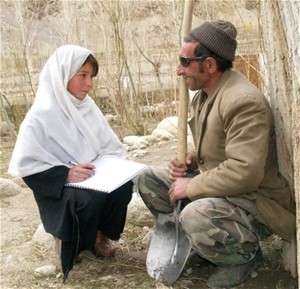
Twelve-year-old Seema interviews a local Wakhan farmer for a USAID-funded survey on livestock mortality. She is a member of one of 56 committees formed at the school level to educate communities and raise awareness about environmental issues that affect t
Wildlife Conservation Society
USAID promotes student environmental activism in Afghanistan’s remote Wakhan region.
23 JUNE 2010 | WAKHAN DISTRICT, BADAKHSHAN PROVINCE, AFGHANISTAN
Perched high in the mountains on the border with China, Pakistan, and Tajikistan, Afghanistan’s Wakhan District seems like the end of the world to most people. To 12-year-old Seema, however, it is her world and she wants to protect it.
Through its partner the Wildlife Conservation Society (WCS), USAID is giving Seema and her peers the tools they need to protect and preserve the mountain environment that supports them. The WCS environmental education program for Wakhan schools operates in all 13 government schools in the district. It is part of a comprehensive strategy to create legislative and community support for environmental practices that contribute to sustainable and appropriate economic development.
The 56 school committees in the Wakhan environmental education program have a total membership of 438 male and 88 female students. There are 82 teachers (including school headmasters) leading the program. Each school has four student committees: wildlife, livestock, forestry, and significant environmental events.
The committees collect data using a simple set of forms developed by the teachers and WCS. The wildlife committees interview herders and fuel wood collectors on a daily basis to record sightings. The livestock committees record the number of animals per household, any increase or decrease, and the reason for the change. The forestry committees collect data on daily household fuel wood usage, including type and amount of fuel wood gathered. The environmental events committees record community events including disputes, that concern the forest; livestock; wildlife (including hunting); and other events such as flooding, weather, or insect pests.
The unprecedented experience with civil society institutions also inspired students in four schools to form cleanliness committees to promote personal hygiene for students and keep the school grounds clean. Thanks to support from the U.S. Government, environmental awareness is rising in the Wakhan region and children are becoming positive agents for change in their own communities.







Comment
Make a general inquiry or suggest an improvement.